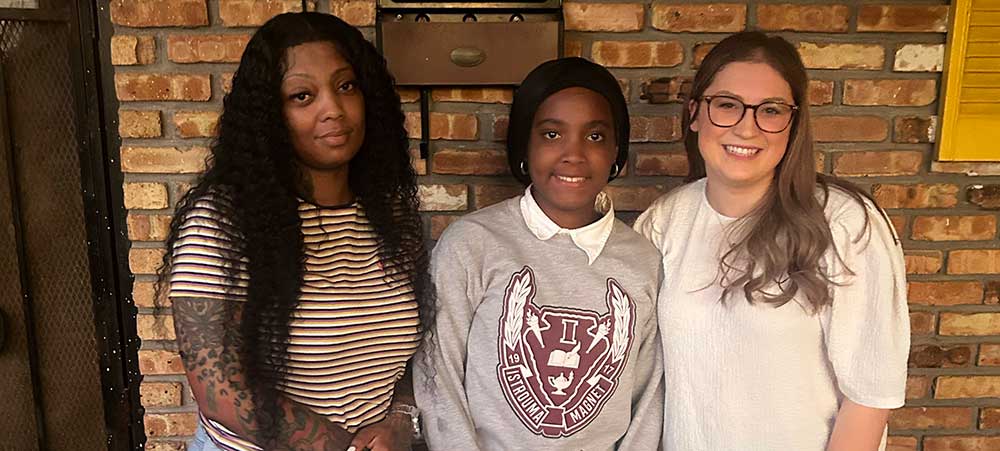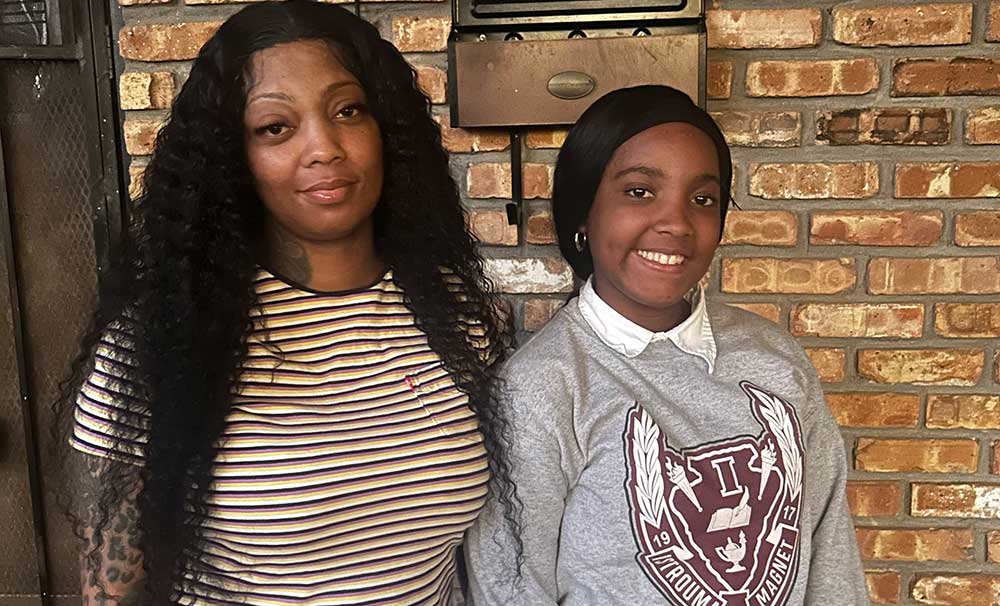Intercept transforms family’s trajectory, keeps them together
Teenagers can create challenging moments for many parents. Those trying moments can be even greater for a single parent who loves and provides for their children but is stretched by work and other demands.
That’s the story of Mavis, a single parent who works as a traveling nurse. During the pandemic, Mavis’ job took her away from her family, including her oldest daughter, Alonzjanae. Although Mavis’ mother cared for the family, her long stretches of time away from the family took its toll.
“Since Mavis traveled for work a lot, a detachment in the relationship developed between her and Alonzjanae,” said Alyssa Bergeron, family intervention specialist for Youth Villages. “When Mavis returned home each time, she tried to be mom all over again. They did not know how to communicate with each other.”
That inability to communicate — especially over Alonzjanae’s cellphone use and Mavis’ monitoring it — increased over time as they were apart. This disconnect grew. The verbal arguments became more frequent and spilled over into Alonzjanae becoming physically aggressive.
Their relationship was close to being beyond repair, even permanently altered due to the constant fighting. Mavis and Alonzjanae were at their darkest moment, and they needed help.
Cellphone issues lead to conflict.
When Alonzjanae was with her grandmother, she took advantage of her cellphone use. She began calling and having inappropriate conversations with other minors, including boys, around her age.
“Alonzjanae had more freedom when staying with her grandmother,” Alyssa said. “Her grandmother wasn’t familiar with technology, so she didn’t look on the phone where Alonzjanae hid who she was talking to. When Mavis returned home, Alonzjanae no longer had the freedom she had enjoyed.”
This caused Alonzjanae to act out verbally and physically against Mavis. Their conflicts moved outside their home, too. At school, Alonzjanae got in frequent physical altercations with classmates, and she ran away from home several times.
“A year earlier, Alonzjanae was physically aggressive with her father when he tried to take the phone from her, but I didn’t believe it at the time,” Mavis said. “Then, she did it to me. The police were called one time, and they told Alonzjanae that she had to listen to me. A couple of months later, the police were called again.”
The conflict reached a boiling point in October of 2023 when there was another confrontation over use of the cellphone. This time, Alonzjanae took the matter further. She went to school and told the administration that Mavis hit her. The school reported the incident to law enforcement, which arrested Mavis and took her to jail.
“I didn’t know she was going to react like that,” Mavis said. “She had done this to me before. I didn’t think I needed help because I didn’t believe her aggression would get that bad.”

Intercept steps in, provides a path to healing
The Louisiana Department of Children and Family Services (DCFS) was called, and a case was opened. The family was referred to Youth Villages’ Intercept, an intensive in-home program that meets children and families at a critical crossroads and helps them find their way to well-being. Intercept can step in to change a family’s trajectory with intensive support, new parenting and communication skills, and evidence- and strengths-based mental health intervention services
Getting the family started, though, wasn’t easy. Mavis was still hurt over what transpired with law enforcement. Moreover, the mother and daughter didn’t want to be around each other.
“When we first opened the case, Alonzjanae did not want to go to Mavis’ house,” Alyssa said. “It was pretty bad because mother was still upset about the whole situation.”
Alyssa began meeting with Mavis and Alonzjanae separately. For Mavis, Alyssa helped her look at different approaches to ask for the phone through Collaborative Problem Solving, an evidence-based approach that helps build and sustain healthy relationships through communication skills, emotion regulation skills, self-regulation skills, problem-solving skill, social skills and empathy/perspective-taking skills.
For Alonzjanae, Alyssa did role playing that helped to explain Mavis’ role in their relationship. Alyssa also worked with her on coping mechanisms to control her anger and process her emotions in a positive way. She helped with safety planning, so Alonzjanae no longer runs away. In a short time, progress has been made.
“She’s (Alonzjanae) more open to talk with me now,” Mavis said. “Before Youth Villages, Alonzjanae always had angry facial expressions when she was around me. She talks now.”
Alonzjanae also sees changes in their relationship and their family.
“Before, when I was around my mother, I wouldn’t really talk with her,” Alonzjanae said. “Now, I try to spend more time with her and talk with her.”
For more information on Intercept, a program model rated as well-supported by the Title IV-E Prevention Services Clearinghouse, go to youthvillages.org/intercept.

